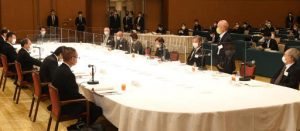A-bomb survivors disappointed by Prime Minister’s repeated and hollow traditional remarks
Aug. 7, 2021
by Seiji Shitakubo and Junya Kuchimoto, Staff Writers
On August 6, a “meeting with representatives of A-bomb survivors” organized by the City of Hiroshima was held at a hotel in Naka Ward, Hiroshima, with Prime Minister Yoshihide Suga in attendance. Representatives from seven Hiroshima A-bomb survivors’ groups, including two Hiroshima Prefectural Confederations of A-bomb Sufferers Organizations (Hiroshima Hidankyo), focused on the remarks of the prime minister whom they met for the first time since he took office last September. Mr. Suga explained his political decision to abandon an appeal in the black rain lawsuit. However, there was no in-depth statement about the abolition of nuclear weapons or relief measures for A-bomb survivors, which left A-bomb survivors stating, “We were disappointed.”
Mr. Suga repeated the same remarks he used in his address during the Peace Memorial Ceremony held earlier in the day: Offer a heartfelt prayer; abide by the three non-nuclear principles; and promote a world without nuclear weapons. About his political decision that brought an end to the black rain lawsuit, Mr. Suga said, “After much consideration, I went back to the principle of the Atomic Bomb Survivors Relief Law, and decided not to appeal the case to the Supreme Court.” His statements were the same as those when he made his announcement in July.
With hopes resting on the new prime minister, A-bomb survivors called for support for second-generation A-bomb survivors and a review of A-bomb disease certification criteria. However, there was no major breakthrough in the response outlined by the government officials, including Norihisa Tamura, Japan’s Minister of Health, Labour and Welfare, who also attended the meeting.
What was symbolic was the Japanese government’s stance on the Treaty on the Prohibition of Nuclear Weapons, which came into force in January of this year. While Mr. Suga said, “As the nation having experienced atomic bombings, we share the goal of the abolition of nuclear weapons the treaty aims at,” he insisted that, “to achieve this goal, it is essential to involve nuclear weapon states in the advancement of nuclear disarmament. The prime minister demonstrated once again that the Japanese government has neither any intention to neither sign nor ratify the treaty to ban nuclear weapons.
After the meeting, Kunihiko Sakuma, 76, chair of the Hiroshima Hidankyo, pointed out that Japan should ratify the treaty because the prime minister made an appeal for adherence to the three non-nuclear principles. Toshiyuki Mimaki, 79, the acting chair of the other Hiroshima Hidankyo (chaired by Sunao Tsuboi), said, “I assume that the prime minister is weary from the Tokyo Olympics and measures in response to the new coronavirus pandemic. However, I hope that he will take concrete steps to move forward with our request.”
(Originally published on August 7, 2021)
On August 6, a “meeting with representatives of A-bomb survivors” organized by the City of Hiroshima was held at a hotel in Naka Ward, Hiroshima, with Prime Minister Yoshihide Suga in attendance. Representatives from seven Hiroshima A-bomb survivors’ groups, including two Hiroshima Prefectural Confederations of A-bomb Sufferers Organizations (Hiroshima Hidankyo), focused on the remarks of the prime minister whom they met for the first time since he took office last September. Mr. Suga explained his political decision to abandon an appeal in the black rain lawsuit. However, there was no in-depth statement about the abolition of nuclear weapons or relief measures for A-bomb survivors, which left A-bomb survivors stating, “We were disappointed.”
Mr. Suga repeated the same remarks he used in his address during the Peace Memorial Ceremony held earlier in the day: Offer a heartfelt prayer; abide by the three non-nuclear principles; and promote a world without nuclear weapons. About his political decision that brought an end to the black rain lawsuit, Mr. Suga said, “After much consideration, I went back to the principle of the Atomic Bomb Survivors Relief Law, and decided not to appeal the case to the Supreme Court.” His statements were the same as those when he made his announcement in July.
With hopes resting on the new prime minister, A-bomb survivors called for support for second-generation A-bomb survivors and a review of A-bomb disease certification criteria. However, there was no major breakthrough in the response outlined by the government officials, including Norihisa Tamura, Japan’s Minister of Health, Labour and Welfare, who also attended the meeting.
What was symbolic was the Japanese government’s stance on the Treaty on the Prohibition of Nuclear Weapons, which came into force in January of this year. While Mr. Suga said, “As the nation having experienced atomic bombings, we share the goal of the abolition of nuclear weapons the treaty aims at,” he insisted that, “to achieve this goal, it is essential to involve nuclear weapon states in the advancement of nuclear disarmament. The prime minister demonstrated once again that the Japanese government has neither any intention to neither sign nor ratify the treaty to ban nuclear weapons.
After the meeting, Kunihiko Sakuma, 76, chair of the Hiroshima Hidankyo, pointed out that Japan should ratify the treaty because the prime minister made an appeal for adherence to the three non-nuclear principles. Toshiyuki Mimaki, 79, the acting chair of the other Hiroshima Hidankyo (chaired by Sunao Tsuboi), said, “I assume that the prime minister is weary from the Tokyo Olympics and measures in response to the new coronavirus pandemic. However, I hope that he will take concrete steps to move forward with our request.”
(Originally published on August 7, 2021)








